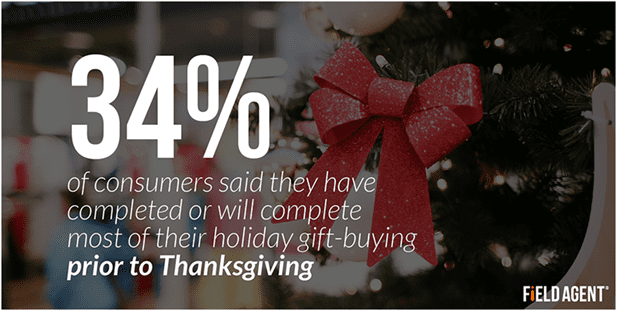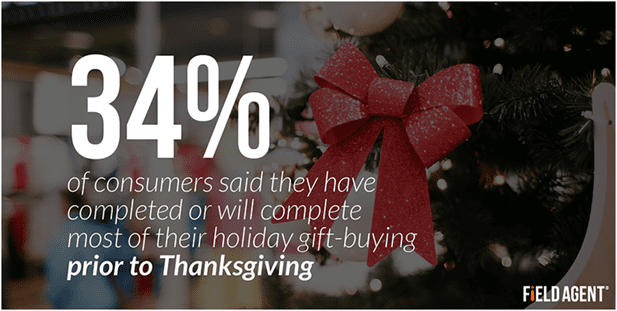The holidays may be a few months away, but that’s no excuse not to do your preseason preparations this early.
In Field Agent’s Christmas Shopper survey, 500 participants answered several pre-holiday questions, and today, we’re sharing it with you to help you gear up for this year’s holiday rush.
These five statistics can help you plan for optimal business performance in this pre-holiday period.
- Pre-holiday holiday shopping

Survey shows that 34% of shoppers have reportedly completed or are in the process of completing their holiday shopping as early as BEFORE Thanksgiving. That means holiday shopping starts earlier than most businesses might think. From mid to late November, people will have already spent their shopping money. If business owners don’t consider this possibility, they could miss out on making big revenue from pre-holiday sales.
- Anxious shoppers
Many consumers feel anxious when shopping for gifts. This year, about 96% have reported that they expect to feel or already feel anxious about whether recipients will like their gifts (55%) and getting value for their money (52%). Other sources of anxiety include shortage in gift-shopping funds (46%), big crowds/maxed out parking lots/long lines (38%), and overspending (34%).
Businesses can boost sales by helping customers reduce shopping anxiety through special promos, wider selections, and other strategies to help brighten their mood.
- Decreased spending
Some 71% among the surveyed consumers reported a decrease in spending for certain items or categories in the autumn months. Why the decrease? They reportedly do this so that they can INCREASE spending for the very same categories around the holidays. These months are critical for businesses because they can spell a drop in sales pre-holiday and a boost later on. Contingency plans must be set in motion during this period as sales can quickly go one way or the other.
- Pre-holiday selling aversion
Many consumers have noticed the change in holiday shopping seasons as they obviously become earlier and earlier with each passing year. While most people have become accustomed to this practice, others are still surprised and baffled by it, with 33% of them saying pre-holiday selling events are inappropriate. 29% of the respondents also said they find it inappropriate for companies to be advertising holiday gift ideas even before Thanksgiving.
One possible solution is to know your market. Business strategies must be based on how the market is moving and where consumers stand on pre-holiday shopping in specific areas.
- Out-of-stock turnoff
88% of consumers said they switched to other stores or products because retailers were out-of-stock. The holiday rush is the worst time to be running low on stocks, so it is crucial for businesses to consider the imminent shopping frenzy and to stock up early. It’s a good way to ensure on-shelf availability regardless of when customers make decision to do their holiday shopping.



